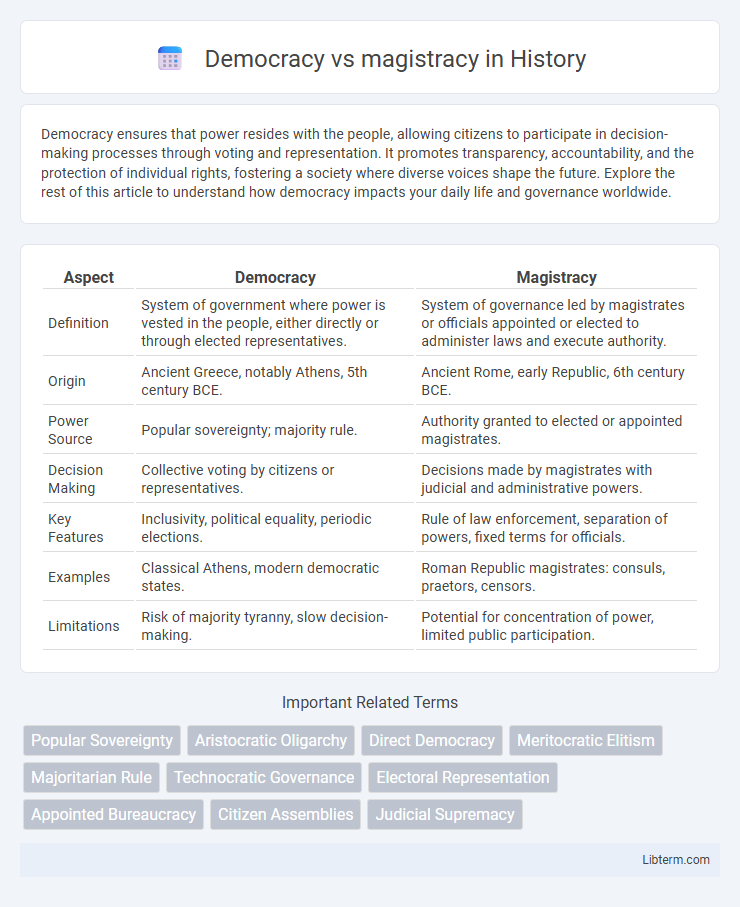Democracy ensures that power resides with the people, allowing citizens to participate in decision-making processes through voting and representation. It promotes transparency, accountability, and the protection of individual rights, fostering a society where diverse voices shape the future. Explore the rest of this article to understand how democracy impacts your daily life and governance worldwide.
Table of Comparison
| Aspect | Democracy | Magistracy |
|---|---|---|
| Definition | System of government where power is vested in the people, either directly or through elected representatives. | System of governance led by magistrates or officials appointed or elected to administer laws and execute authority. |
| Origin | Ancient Greece, notably Athens, 5th century BCE. | Ancient Rome, early Republic, 6th century BCE. |
| Power Source | Popular sovereignty; majority rule. | Authority granted to elected or appointed magistrates. |
| Decision Making | Collective voting by citizens or representatives. | Decisions made by magistrates with judicial and administrative powers. |
| Key Features | Inclusivity, political equality, periodic elections. | Rule of law enforcement, separation of powers, fixed terms for officials. |
| Examples | Classical Athens, modern democratic states. | Roman Republic magistrates: consuls, praetors, censors. |
| Limitations | Risk of majority tyranny, slow decision-making. | Potential for concentration of power, limited public participation. |
Understanding Democracy: Core Principles
Democracy centers on popular sovereignty, where citizens exercise power through voting and participation in free, fair elections, ensuring government accountability and transparency. Fundamental principles include political equality, protecting individual rights, and promoting majority rule while safeguarding minority interests. In contrast, magistracy involves appointed or elected officials exercising judicial or administrative authority, often embodying the rule of law and checks on democratic power.
Magistracy Defined: Role and Responsibilities
Magistracy refers to the office and duties of a magistrate, who serves as a judicial officer with authority to administer laws, adjudicate disputes, and maintain public order. Unlike democratic institutions that emphasize collective decision-making, magistrates exercise legal authority often grounded in statutory or constitutional mandates, ensuring impartial enforcement of justice and governance. Key responsibilities include presiding over courts, issuing warrants, ruling on legal motions, and overseeing the administration of local government functions, which reinforces the rule of law within both democratic and non-democratic systems.
Historical Origins of Democracy and Magistracy
The historical origins of democracy trace back to ancient Athens around the 5th century BCE, where citizens participated directly in decision-making processes. Magistracy, originating in Roman civilization, referred to elected officials who wielded executive and judicial powers within the republic's legal framework. These ancient systems established foundational governance structures that influenced modern democratic institutions and the separation of powers.
Key Differences Between Democracy and Magistracy
Democracy is a political system where power is vested in the hands of the people, typically through elected representatives, emphasizing majority rule and citizen participation in governance. Magistracy refers to the office or authority of magistrates, who are officials tasked with administering laws, often acting with judicial or administrative powers, and operate within a defined legal framework rather than representing the popular will. Key differences include that democracy centers on collective decision-making and political legitimacy from the electorate, while magistracy focuses on enforcing laws and maintaining order through appointed or institutional authority.
Decision-Making Processes in Both Systems
Democracy emphasizes collective decision-making through voting and public participation, ensuring that policies reflect the majority's will and promote transparency. Magistracy relies on appointed officials or magistrates who possess authoritative decision-making power, often operating within legal frameworks to enforce laws and maintain order efficiently. The contrast highlights democratic inclusivity versus magistrate-driven governance, influencing the speed and nature of policy implementation.
Accountability and Transparency in Governance
Democracy emphasizes accountability through elected representatives who are directly answerable to the public, ensuring transparency via open legislative processes and public scrutiny. Magistracy, rooted in judicial authority, upholds accountability by impartial enforcement of laws, with transparency maintained through documented legal proceedings and judicial reviews. Both systems prioritize governance integrity but operate through distinct mechanisms of oversight and public engagement.
Power Distribution: People vs. Officials
Democracy allocates power primarily to the people, enabling citizens to participate directly or through elected representatives in decision-making processes. Magistracy centralizes authority in appointed officials or magistrates, who enforce laws and administer governance with limited public input. This distinction shapes the balance between popular sovereignty and bureaucratic control in political systems.
Citizen Participation and Representation
Democracy emphasizes broad citizen participation, enabling individuals to vote, voice opinions, and influence policy decisions directly or through elected representatives. Magistracy, often characterized by appointed officials or magistrates, limits direct citizen involvement, focusing on governance by selected authorities who interpret and enforce laws. Representation in democracy seeks inclusivity and accountability, whereas magistracy prioritizes administrative expertise and legal authority over popular participation.
Advantages and Disadvantages of Each System
Democracy offers broad citizen participation and accountability, fostering representation and protecting individual rights, but it can lead to slow decision-making and potential majority rule issues. Magistracy ensures efficient administration and legal expertise through appointed officials, promoting stability and consistent rule enforcement; however, it may lack public input and limit transparency, risking authoritarian tendencies. Balancing democratic inclusiveness with the magistrates' specialized authority remains a core challenge for effective governance systems.
The Future of Governance: Hybrid Models
Hybrid governance models blend democratic principles with magistracy structures to balance citizen participation and expert administration. These systems integrate elected representatives with appointed magistrates who possess specialized knowledge, enhancing policy implementation and accountability. Emerging trends in governance emphasize hybrid frameworks to address complex societal challenges through collaborative decision-making and professional oversight.
Democracy Infographic

 libterm.com
libterm.com